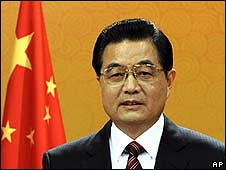
Premier from the People Republic of China, Wen Jiabao, has visited Africa and pledged greater cooperation between the PRC and the continent. The PRC maintains good relations with the Republic of South Africa.
Originally uploaded by Pan-African News Wire File Photos
By MARTIN CRUTSINGER,
AP Economics Writer
WASHINGTON – The United States and China are striking a conciliatory tone in their public comments during economic talks, although that hasn't stopped China from posing some pointed questions behind closed doors about such issues as America's soaring budget deficit.
The Obama administration has questions it wants answered as well in such areas as China's long reliance on massive trade surpluses with the United States to bolster its domestic economy.
Both sides are expected to wrap up two days of high-level talks Tuesday with a joint communique that will lay out a work plan that both sides will tackle in upcoming meetings.
Officials from both nations played down the prospects for any breakthroughs this week on the major issues that separate the two nations, including America's massive trade deficit with China. Critics have blamed the trade deficit over the years for the loss of millions of U.S. manufacturing jobs.
President Barack Obama opened Monday's discussions by declaring that the United States sought a new era of "cooperation, not confrontation" with China and that management of the U.S.-China relationship would be a major factor in defining the history of the 21st century.
Obama dispatched his top economic officials — Treasury Secretary Timothy Geithner, National Economic Council Director Lawrence Summers, White House budget director Peter Orszag and Federal Reserve Chairman Ben Bernanke — to try to reassure China that the U.S. will not let deficits or inflation jeopardize the value of Chinese investments.
U.S. briefers said the president's team told the Chinese that the United States was committed to making sure the economic and monetary stimulus being used to fight the recession did not fuel inflation.
U.S. officials told reporters that the U.S. side stressed to the Chinese that the United States has a plan to bring the deficit down once the economic crisis has been resolved. They said Bernanke discussed the Fed's exit strategy from the central bank's current period of extraordinary monetary easing, emphasizing that the Fed was being careful to guard against future inflation.
The Chinese, who have the largest foreign holdings of U.S. Treasury debt at $801.5 billion, have been expressing worries that soaring deficits could spark inflation or a sudden drop in the value of the dollar, thus jeopardizing their investments. Chinese officials said those concerns were raised during Monday's talks.
"We sincerely hope the U.S. fiscal deficit will be reduced, year after year," Assistant Finance Minister Zhu Guangyao told reporters after the Monday talks had ended.
"The Chinese government is a responsible government and first and foremost our responsibility is the Chinese people, so of course we are concerned about the security of the Chinese assets," Zhu said, speaking through an interpreter.
The discussions on America's deficits and China's role in financing them highlighted the growing economic importance of China, now the world's third largest economy.
The discussions in Washington represent the continuation of talks begun by the Bush administration. While the initial talks focused on economic issues, Obama wanted the agenda expanded to include foreign policy issues such as America's drive to get China's support for more international pressure to curb North Korea's nuclear ambitions.
Geithner and Secretary of State Hillary Rodham Clinton were leading the U.S. team. The Chinese delegation was led by Chinese State Councilor Dai Bingguo and Vice Premier Wang Qishan.
David Loevinger, Treasury's senior coordinator for China affairs, said Orszag and Summers both stressed the commitment of the administration to attacking the U.S. deficits.
"There were serious questions about what the economic outlook is and ... our plans for withdrawing stimulus," Loevinger told reporters.
Geithner traveled to Beijing last month to assure Chinese officials that federal budget deficits, which have ballooned because of government efforts to deal with the recession and stabilize the financial system, would be reined in once those crises have passed.
Many private economists have said the Chinese are right to worry about a U.S. budget deficit that is projected to hit $1.85 trillion this year, four times the previous record.
Associated Press writer Foster Klug contributed to this report.
No comments:
Post a Comment